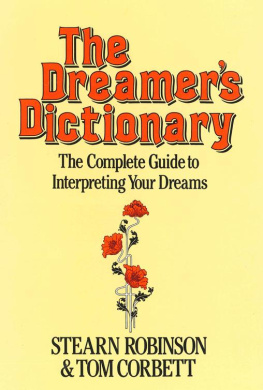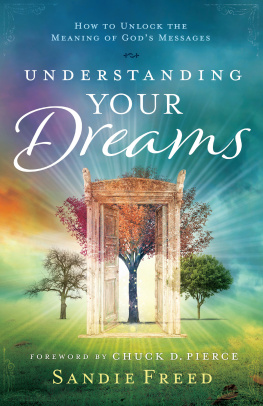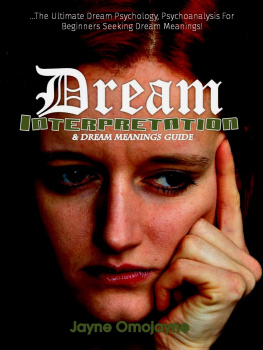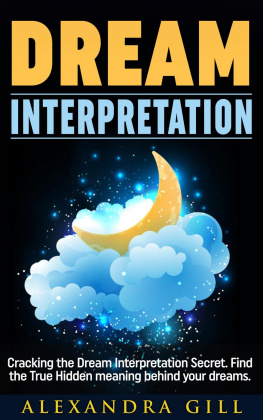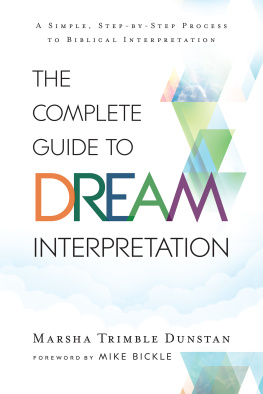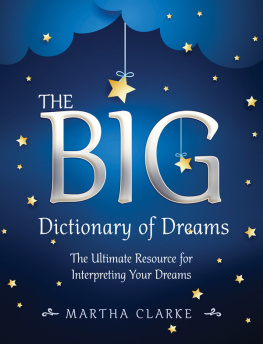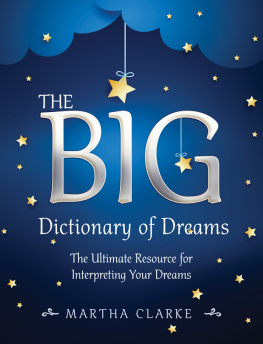F rom time immemorial dreams have been regarded with an interest transcending mere superstition. Their cause and their meaning have been the subject of study and investigation by learned men throughout the ages. The many references to records concerning dreams which turned out to be events casting their shadows before them can leave little doubt as to the importance of dreams in history.
What are dreams? Well, through the past centuries, dreams were defined as states of consciousness occurring during sleep. We inherited this nebulous and paradoxical definition before the rise of physics; but since the mid-nineteenth century a great deal of scientific research has been done to try to establish more clearly the nature of dreams.
Dreaming certainly belongs to our most intimate experiences. Generally , during waking hours, our reaction to our experiences is mainly emotional. In our dreams it is even more emotional because dreams are a concentrating agent for our various subjective motives. They also constitute an interrelation between the now, the past, and the future of human experience. In our dreams we create a world where space and time have no limiting power. In his fascinating book AnExperimentwithTime, Professor Dunne proposes the theory that all the time that is now, has been, or will be is like a river, and that you can navigate this river, forward, backward, and presumably sideways, in the vessel of your dreams.
Herder, the German philosopher, states that dreams are but the ideals of all poetic arts, while Jean Paul Richter, another German author, thinks that dreams are involuntary experiences leading to the composition of poetry. Both these writers concur with other great ones of the past, such as Nietzsche, Kant, and Novalis.
F. W. Hildebrandt wrote in 1875, Dreams help us to inspect those hidden depths of our existence which are mostly beyond our reach during our waking hours. Dreams bring us such refined insight into self-knowledge and such revelations of half-conscious dispositions and powers that on waking up, we may well admire the sharp-eyed demon that helped us find the hidden plot. A dream can warn us from within with the voice of a watchman stationed at the central observatory of our spiritual life. And our dreams can also warn us of the dangerous steps we have already taken!
Most dreams are in the form of visual images. And through visual images we are able to explore the human mind. Jung, the brilliant Swiss psychiatrist, pointed this out concisely when he stated, Visual images have the quality of the human soul! The mental pictures you can carry over the threshold of your consciousness are unimportant mites when compared to the wealth of dream imagery.
Every human emotion and experience can be reflected in dreams. Consider for a moment the infinite possibilities. A dream may be happy or sad; joyful or tragic; frightening or reassuring; full of love or bristling with hostility; it may be religious or sacrilegious, inspiring, depressing, or amusing and so on ad infinitum.
Through the ages dreamsand their interpretationshave been recorded on cave walls and stone slabs, and one can imagine thereby that those dreamers compared notes with each other on the happenings which followed, and so through some shaggy scientific-minded cave dweller began the study of the omens, prophecies, and warnings contained in dreams which have since been woven into the very fabric of life, until they have become a part of art, literature, and religion as well as science.
The ancient Assyrians, Babylonians, Egyptians, and others did a great deal to disseminate the dream lore of their times, and centuries later when Artimedorus compiled his Oneiro-critica on this subject, it proved so popular that sixteen hundred years later its first English translation had been reprinted thirty-two times by the year 1800. But besides the Greek, there are ancient dream books in many languages, such as Hebrew, Latin, French, Italian, German, Arabic, Russian, and even Siamese. Needless to say, no book on this subject can ever be completely comprehensive, for to be so it would have to cover the whole of human experience and knowledge.
Friedrich Hebbell, who was a dedicated student of dream problems, stated that In dreams fantasy gets even with the shameless imp, Reason. And Cicero, the Roman statesman and author (10643 B.C. ), wrote almost two thousand years ago, nothing can be so silly, so impossible, or so unnatural that it cannot happen in a dream. And today, almost two thousand years and mountains of research later, it is still true that nothing is either impossible or ridiculous in a dream; because a dream can be likened to a very private script, written, produced, and directed by the dreamer. Sometimes the dreamer takes the leading role, but in all cases he or she is the only audience, and each time he or she falls asleep, there is an opening of a new show, because everybody dreamsevery night! At this point you may be saying, I dont; maybe other people, but not me! Which may seem to be a reasonable reaction, since even those who know they dream may claim to remember times when supposedly they didnt.
But reasonable or not, the reaction must be completely discounted. According to extensive scientific research, at the University of Chicago, Walter Reed Institute of Research, Harvard University, Mount Sinai Hospital, as well as countless learned institutions all over the world, it has been conclusively proved that everybody dreams every night. You may be wondering how such a fact could have been proved. The an swer is by monitoring the nightly sleep of thousands of volunteers. By measuring their heart action, respiration, eye and body movements, brain waves, and, when indicated by these physical responses, awakening them throughout the night to inquire, Were you dreaming? Invariably the response was yes, even from those who previous to the experiment had insisted they never dreamed. Furthermore these scientific studies found that you have a minimum of three dreams a night, but you can have as many as nine. It has also been established that the congenitally deaf and/or blind dream, that children as young as eight months dream, that people of very low IQ dream no less than those of very high IQ.
You may be among the small minority who remember most of your dreams in vivid detail; or you may belong to the large majority who remember only vague parts of your dream, or you may be one of the sizable group who forgets everything. But no matter what you do or dont remember about your dreams, and regardless of who or what you are, it is certain that you do dream. Dreaming is a natural process like breathing, and there is no way, except for the right combination of drugs, or overindulgence in alcohol, that you can prevent it.
As a matter of fact recent experiments with dream withdrawal suggest that, if you deprive a man of his dreams, you take a chance that he will eventually act out his psychotic tendencies while hes awake, and this, in turn, gives rise to the hypothesis currently propounded in some scientific circles that as dreams allow one to go safely and quietly insane for a time each day, it is not, as heretofore believed, the sleep that is necessary for our well-being, but the dreams.
Be that as it may, the extraordinary power of the subconscious mind to dramatize problems or assimilate material only partially comprehended by the conscious mind is spectacularly documented in the field of science itself. One of the more recent examples is that of physiologist Otto Loewi who dreamed one night of an experiment which might prove his theory concerning the transmission of nerve impulses. He set up the experiment in his laboratory exactly as he had dreamed it, and it worked, subsequently leading to Loewis receiving a Nobel Prize.

